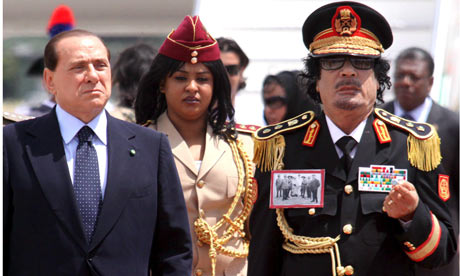Berlusconi y Gaddafi cambian dinero por inmigrantes 'sin papeles' en Roma
Las ONG denuncian la política libia en la primera visita del dictador a Italia
MIGUEL MORA - Roma - 11/06/2009
El líder libio Muammar el Gaddafi llegó ayer a Roma para ratificar el acuerdo bilateral de cooperación económica y migratoria con Italia, que zanja décadas de tensión entre la ex colonia y la ex metrópolis. Gaddafi, de 67 años, fue recibido por Silvio Berlusconi, de 72, en el aeropuerto, mientras en la calle se organizaban sentadas de protesta y manifestaciones. La oposición se opuso a que Gaddafi pronunciara hoy un discurso ante el Senado. El coronel se limitará a visitar el Parlamento.
La noticia en otros webs
Italia invertirá 3.564 millones de euros para mejorar las infraestructuras
El pacto tiene un elemento crítico: el uso de patrullas navales conjuntas
Gaddafi aterrizó con sus inseparables amazonas y su habitual parafernalia beduina. Desafiante, llevaba cosida en la pechera de la casaca militar una foto de Mukhtar, líder de la guerra colonial asesinado por los fascistas italianos. La jaima quedó instalada en Villa Pamphili, un enorme parque, entre excepcionales medidas de seguridad. Berlusconi dijo que se trata de una visita histórica y Gaddafi recordó que ha venido porque Italia finalmente pidió perdón por los abusos coloniales.
La primera visita de Gaddafi a la capital italiana sella el importante acuerdo según el cual Roma invertirá 5.000 millones de dólares (3.564 millones de euros) en el país africano, a razón de 200 millones anuales durante 25 años, para mejorar las infraestructuras.
Fuentes oficiales revelan que Italia aportará recursos humanos y tecnología a Libia para construir un sistema de radares para vigilar las fronteras del desierto sur.
El pacto tiene un elemento crítico, el uso de patrullas marítimas conjuntas en aguas libias e internacionales para evitar que los inmigrantes que zarpan en barcos desde Libia lleguen a las costas italianas. La ONG Human Rights Watch recordó que en un mes de patrullas han sido devueltos a Libia 500 inmigrantes, y aportó testimonios directos de torturas y maltratos en los centros libios.
Bill Frelick, director para refugiados políticos de la ONG, afirmó que "Berlusconi y Gaddafi venden el acuerdo como un tratado de amistad, pero en realidad es una alianza sucia que permite a Roma eludir las leyes internacionales sobre el asilo. Libia tiene una terrible marca de abusos y maltrato de emigrantes, y no puede ser visto en ningún caso como un socio serio para proteger a los refugiados".
Human Rights Watch, que acaba de visitar Libia, Malta e Italia para entrevistar a inmigrantes, afirma que todos los sin papeles que han pasado por los centros libios se quejan de haber sufrido torturas, malos tratos, hambre, detenciones sin límite de tiempo y "condiciones inhumanas y degradantes".
Libia no ha firmado la convención de la ONU de Derechos Humanos y carece de un sistema de asilo político. Las ONG calculan que hay miles de sin papeles en los 40 centros de retención libios, pero ignoran cuántos de ellos son refugiados. Los emigrantes interceptados son devueltos a Libia en masa y sin criba. Si alguno necesita protección o es particularmente vulnerable, si hay enfermos o heridos, embarazadas, menores o víctimas de trata, no se sabe.
En este momento hay tres navíos militares italianos patrullando en aguas libias y está previsto que otros tres entren en acción en semanas. El centro de Lampedusa, hasta hace un mes abarrotado y que en tiempos recientes sufrió un motín y un incendio, está hoy vacío.
El Alto Comisionado de Naciones Unidas para los Refugiados (ACNUR) expresó su profunda preocupación el 7 de mayo por la devolución automática de sin papeles. Tomas, un eritreo de 24 años que intentó abandonar Libia cuatro veces hasta que Italia le concedió asilo, fue torturado en numerosas ocasiones, según ha explicado a HRW: "Me pegaron tres guardias con palos de metal y de madera. Me pegaron durante más de 10 minutos. Me llamaban negro y me pegaban. Cuando caí al suelo me dieron patadas. Me golpearon la cabeza con una barra de metal".
Su relato completo se puede leer en la web www.hrw.org/node/83699.






